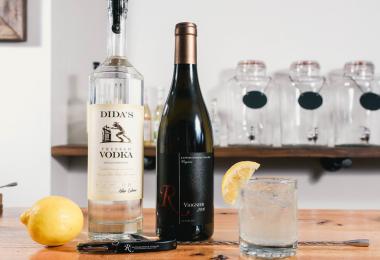In a region where red wine is king, Kuala Lumpur has stepped out of the shadow cast over Asia by Old World wines. Young, middle class Malaysians are spending more of their rising disposable incomes on premium wine products and leaning towards the lighter white styles of New World wines.
In 2017, Malaysia’s wine and spirits market grew 12%, with a turnover of M$236m ($56.72m), according to statistics from the French trade commission, Business France Malaysia. In the five years to 2016, wine imports had grown an impressive 23% to about $86m. Australia leads the way, capturing 46% of the market, followed by France (15%), Chile (6%) and the USA (6%).
According to business analytics company GlobalData, wine is increasingly seen by young urbanites as a lifestyle drink to be enjoyed socially with friends and family – a modern, fashionable choice distinct from the brandy and whisky their parents drink at weddings, celebrations and Chinese New Year. GlobalData predicts the compound annual growth rate of wine expenditure per capita will grow by 7.5% to 2021, boosting mid-market and premium wine sales.
Super sellers
Supermarkets dominate the off-trade, with home-grown grocery chains leading in terms of choice, quality, variety and depth, says Thomas Ling, an industry consultant, educator and sommelier. Jaya Grocer and Village Grocer each have well-stocked, well-priced wine sections, whereas the price-centric hypermarkets AEON, Isetan and Giant conveniently offer large, affordable selections of mainstream wines, but at the expense of diversity.
Chinese convenience stores Herbs N Food, Tong Woh Enterprise and Hock Choon Supermarket also attract wine enthusiasts. While specialist wine stores do exist, they struggle to match the convenience of these other channels.
Adding to independent wine shops’ woes are extensive direct-to-consumer sales by importers. There are about 100 wine and spirits importers in Malaysia, some of which operate their own retail stores and bars and have large corporate and consumer databases to drive sales. With big-spending locals buying direct and expatriates scanning supermarket shelves, the potential customer base for independents is limited. “It’s a tough fight for independent retailers,” says Robert Gilliland, former managing director of The Straits Wine Company and now owner of Drift Dining and Bar.
The Malay Mail news service in June 2019 reported a pushback against supermarket sales. Lobby groups had demanded that liquor be made less accessible by limiting sales to designated premises only, and not to sundry (delicatessen/grocery) stores like delicatessens. If implemented, this change could boost the independent wine retail business.
E-commerce is growing, but adoption has been slow and the channel remains niche and fragmented, Ling says. Specialised e-store and wine delivery service WineTalk was the leading platform, but has scaled back to more traditional retail following its purchase by large importer Luen Heng F&B. WineTalk’s former sommelier David Stephan moved on to Albert Wines & Spirits, which recently launched its online platform Albertwines2u.
DiineOut and Boozeat have both achieved good online followings by packaging wine sales with value-added services and experiences.
Whites do well
While still red wine captures a good slice of the market, the split between red and white is much more even in Malaysia than elsewhere in Asia. New Zealand Sauvignon Blanc is benefiting from the growing preference for whites, as are sweeter, fruitier styles from Australia, Chile, USA and Argentina. And consumers are reaching beyond the well-known brands.
A decade ago, importers were ahead of the market. “The range of wine imported was more nuanced than required by consumers,” Gilliland says. But consumer demand has now caught up. Gilliland sees a future in Kuala Lumpur for new lines such as organic wine, but says organic wine’s growth is constrained by price and high, yet manageable, taxes.
Importer AsiaEuro has a large portfolio and wide distribution network. Luen Heng F&B, Caldbeck Macgregor, Sunrise Wines & Spirits, Vinsprit and Muihua/Magnum Wines & Spirits are other successful commercial importers. Milawa Wines & Spirits’ portfolio is another good example of the range of countries and labels available in Kuala Lumpur.
The individuals and companies bringing in small amounts of wine have made the market far more interesting, Gilliland says. Mid-sized importer Dionysus Asia, once a small player, recently increased its profile and portfolio. Other mid-sized importers with vibrant sales and marketing support teams are Cave & Cellar, In Vino Veritas and Vie du Vin. Fine Wine Merchants brings in a good range of Burgundy, and others such as New Zealand Unlimited and a handful of Spanish- or Italian-only importers specialise in just one country.
Brand activity and a “mushrooming” of restaurant and wine bars are driving industry development, Ling says. “Brand owners organise tasting and pairing events to promote their products and educate consumers, and we are seeing niche crossovers between wine and sake or spirits to raise awareness and capture new markets.”
But perhaps the greatest boost to wine culture has come in the form of bars. “Bar-retail concepts such as Cellar Eighteen, The Winery, Vintry, The Public House KL and The Wine Poetry lead the way,” Ling says. “And there are boutique concepts, like natural and organic wine bars, and country-specialist retailers.”
Drift Dining and Bar has a short, sharp international wine list to accompany the restaurant’s Australian-style share plates which offer a casual, social approach to meals and drinking. At Justwine, Gallo Wine Bar, Soulvino, Bobo KL and Michelangelo’s, live music performances draw in customers.
Sommelier brain drain
WSET Level 1 and Level 2 courses are offered at Berjaya University College of Hospitality and Taylor’s University College, and wine students can access programmes by the Society of Wine Educators, but many employers deem the cost of these courses prohibitive. Overall, wine is yet to be considered a widely respected industry here, although a handful of local professionals have taken the introductory and certified courses by the Court of Master Sommeliers.
Many Malaysian sommeliers move to greener pastures in Japan, Hong Kong, New Zealand, Macau and Singapore where certification is valued and salaries are attractive. The first Malaysian-born Master of Wine, Stephen Wong MW, studied from his adopted home city of Wellington, New Zealand where he now operates Wine Sentience, a wine and hospitality training business.
Ling says region-based classes such as L’ecole du Vin de Bordeaux from CIVB and Bourgogne Wine Board from BIVB deliver customised professional training and crafted content that are relevant and cost effective for local hospitality professionals. His organisation, Entwine, offers these programmes as part of its training solutions.
Accomplished local sommelier Justin Ho has a number of local and international championships under his belt. By day, Ho lectures students at Berjaya and Taylor’s universities and he also moonlights as a respected industry consultant to the city’s bar scene. Ho’s associate Danny Tai is a respected sommelier who recently co-opened wine bar Vinoble, which doubles as a retail space. Malaysia’s first female champion sommelier Yong Yi Ying worked her way up from buffing wine glasses to become a successful private sales consultant and was certified a sommelier by CMS in 2017. Alison Christ, wine manager and sommelier at Troika Sky Dining, has a good reputation for her tastings and lists at Claret wine bar and other Troika building restaurants. Certified sommelier Suraya Kaiv sets the wine list and devises delicious food and wine pairing dinners at Altitude at Banyan Tree resort. Outside the city of Kuala Lumpur, Kevin Yee oversees one of the country’s largest fine wine lists at Resorts World Genting, while Indra Mohan delivers an eclectic list of wines and notable local food pairings at The Datai Langkawi, an island that benefits from duty free status along with Labuan and Tioman.
While Kuala Lumpur’s wine market might be perceived as small, its consumer profile is diverse and interesting. Drinkers in the city’s sizeable expatriate and multi-ethnic communities have followed their palates and embraced new world characteristics and white wines that are well-suited to Malaysia’s tropical climate and spicy cuisine.
Debra Meiburg MW
This article first appeared in Issue 6, 2019 of Meininger's Wine Business International magazine, available by subscription in print or digital.








